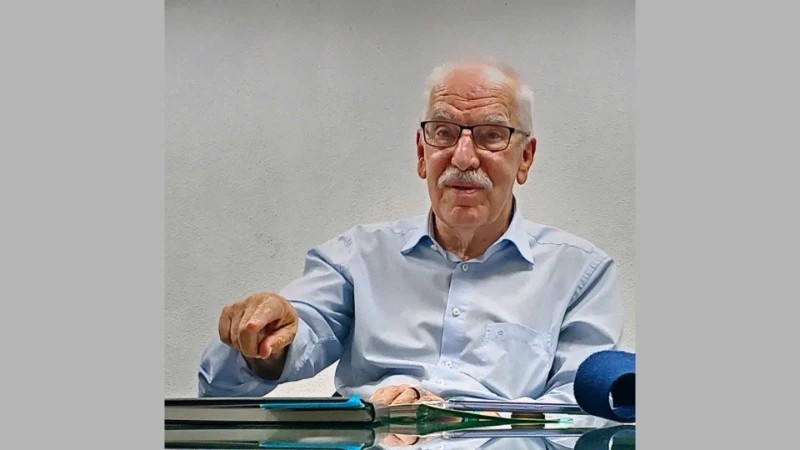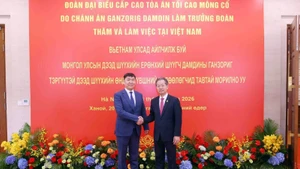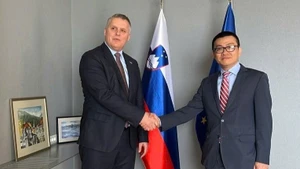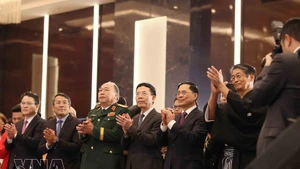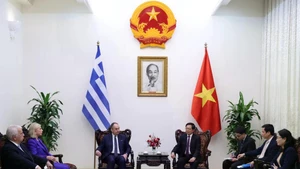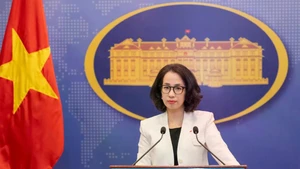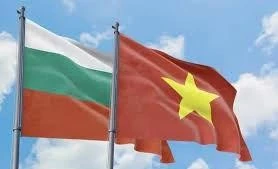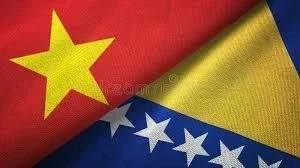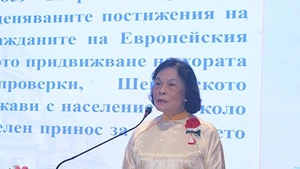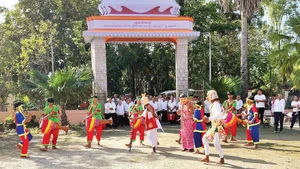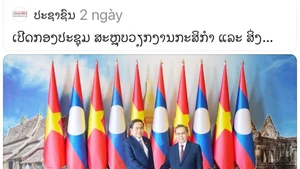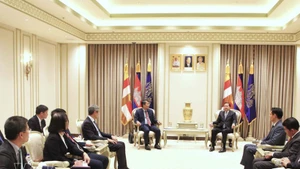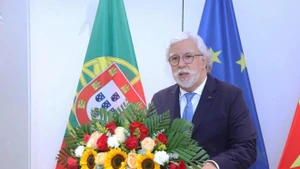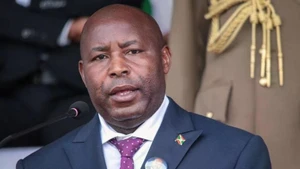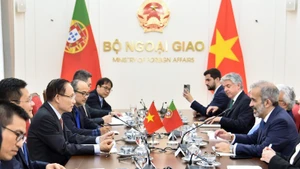This was the assessment of Dr Carolus Wimmer, Chairman of the Venezuela-Vietnam Friendship House, in an exchange with a reporter from Nhan Dan Newspaper about the historical significance of the Spring 1975 General Offensive and Uprising.
Q: It’s known that you have always had special affection for Vietnam and its people. Despite being 80 years old, you still actively participate in preserving and enhancing the Venezuela-Vietnam Friendship House, an exemplary project representing the friendship between the two countries. We understand that you have visited Vietnam several times. Could you share your impressions and special feelings about such visits?
A: I visited Vietnam three times in 2016, 2017 and 2022. In 2016, I first arrived in Hanoi to attend the International Meeting of Communist and Workers’ Parties. Besides the official activities of the meeting, including meetings with the General Secretary of the Communist Party of Vietnam and other senior Party leaders, I had the opportunity to interact with many figures and work with several Vietnamese organisations.
I was most impressed by meetings with individuals involved in people-to-people diplomacy, such as Nguyen Thi Binh, former Vice President of Vietnam; Vu Xuan Hong, President of the Vietnam Union of Friendship Organisations; Professor Nguyen Viet Thao, Deputy Director of the Ho Chi Minh National Academy of Politics and Chairman of the Vietnam-Venezuela Friendship Association.
During this visit, I also had the honour of giving a talk at the Ho Chi Minh National Academy of Politics and participating in the opening ceremony of the Vietnam-Venezuela Cooperation Office for the Vietnamese rice cultivation project in Venezuela.
Before visiting Vietnam, I always imagined a heroic Vietnam bravely fighting against American imperialism, the activities showing solidarity of proletarian internationalism with Vietnam, especially the “Nguyen Van Troi Campaign” in 1964 in Venezuela.
However, immediately upon setting foot in Vietnam, I saw a peaceful country with no remnants of war. I could feel the preservation of traditional cultural values in Vietnam, alongside dynamic development oriented towards the future.
The Vietnamese people work very hard, particularly the younger generation who strive to study and contribute to building an industrialised, modernised country advancing towards socialism. I was very impressed by the cheerful, friendly and hospitable character of the Vietnamese people. I especially love Vietnamese cuisine. I hope to visit Vietnam again soon.
Q: As you’ve shared, in your mind, Vietnam has always been a heroic, resilient country in its struggle against American imperialism for national independence and reunification. In just a few days, the Vietnamese people will celebrate the 50th anniversary of Southern Liberation and National Reunification. Could you share your assessment of the significance of this victory?
A: The successful Spring 1975 General Offensive and Uprising concluded the Vietnamese people’s resistance war against American imperialism, liberated the nation, reunified the country, and opened a new era for Vietnam—an era of independence, unity and progress towards socialism.
 |
| Dr Carolus Wimmer speaking at a seminar on the life and career of President Ho Chi Minh and the Vietnamese revolution, organised by the Vietnamese Embassy in Venezuela in coordination with the Venezuela-Vietnam Friendship House, commemorating the 94th anniversary of the founding of the Communist Party of Vietnam. (Source: Vietnamese Embassy in Venezuela) |
This victory demonstrates the heroism, morality and wisdom of the Vietnamese people in the Ho Chi Minh era. It was also a major international event with profound significance.
In my view, the Vietnamese people’s April 30 Victory stemmed from many factors, the most decisive being the correct and skilful leadership of the Communist Party of Vietnam. By creatively applying Marxism-Leninism, the Party and President Ho Chi Minh, based on the practical situation both globally and domestically, determined appropriate resistance policies and implementation for each developmental stage of the Vietnamese revolution.
Upholding the banner of national independence and socialism, in 1964, the Communist Party of Vietnam decided to simultaneously undertake two strategic missions. First, to carry out the socialist revolution in the north. Second, to implement the people’s national democratic revolution in the south with the aim of achieving national independence, national reunification and progression towards socialism.
During the revolutionary period from July 1954 to May 1975, the Communist Party of Vietnam considered the north as a solid rear base, thus the socialist revolutionary cause in the north was of great importance to the Vietnamese revolution.
The south was the major front, and the people’s national democratic revolution in the south directly determined the liberation of the south and national reunification. The socialist revolution in the north and the people’s national democratic revolution in the south had a close and mutually supportive relationship. This demonstrates the insight and correctness of the Communist Party of Vietnam, which played a decisive role in the victory of the arduous and prolonged resistance against the US.
For the Vietnamese people and country, the destruction of war can hardly be measured by statistics. However, figures do partly reveal the brutality of the war. The amount of bombs and mines that the US dropped on Vietnamese territory was four times greater than the amount the US used during World War II. Hundreds of thousands of Vietnamese died in this war.
The unity and solidarity of the military and the people under the leadership of the Communist Party of Vietnam, especially the role of President Ho Chi Minh, has led to victory for the Vietnamese nation.
Moreover, the Vietnamese people also acknowledge the contributions and support of international friends in this victory. The Vietnamese people fought for the right cause and achieved a glorious victory 50 years ago.
The April 30 victory not only holds historical significance for Vietnam but also for the Indochinese countries and the international community, marking the liberation struggle of the Lao and Cambodian people, while also causing a "loss of face" for the American imperialists and their allies.
Q: As you have noted, the April 30 victory is significant not only historically for Vietnam but also for the Indochinese countries and the international community. In your opinion, what does this victory mean for the struggle for national liberation in Venezuela?
The Spring 1975 General Offensive and Uprising successfully ended the resistance of the Vietnamese military and people against American imperialism, liberated the nation, unified the country, and opened a new era for Vietnam, which is an era of independence and socialism.
This victory reflects the heroism, ethics, and intelligence of the Vietnamese people in the Ho Chi Minh era. It is also a significant international event with deep meaning.
Dr Carolus Wimmer,
Chairman of the Venezuela-Vietnam Friendship House
A: Vietnam is a shining example for the people of Venezuela in their struggle against imperialism, gaining independence, and building socialism. The Venezuelan people admire the determination, discipline, and faith of the Vietnamese people in the current struggle to build and protect the Fatherland. President Nicolas Maduro has shared that the people of Venezuela congratulate the descendants of Uncle Ho for their determination and courage. An example for the world.
In Venezuela, the new military doctrine emphasises the importance of military-civilian solidarity, learned from the experience of “people's war” in Vietnam, which helped achieve victory in the resistance against the French colonialists and American imperialism.
In my opinion, Vietnam's victory in the war against American imperialism stemmed from two key factors. First, the Vietnamese people had extensive experience from the fight against Japanese fascism in the 1940s and the struggle against French colonialists in the 1950s. Through these struggles, the Vietnamese people strengthened their sense of independence and sovereignty and recognised the important role of the military and economy in warfare.
Second is the solidarity and bond between the Vietnamese people and the Communist Party of Vietnam and the People's Army. Vietnam successfully implemented “people's war” by taking the armed forces as the core combined with building a nationwide armed base, transforming workplaces, universities, and fields into combat units, where every citizen is a soldier, determined to protect independence and territorial sovereignty. This mobilised the strength of the people, ensuring the success of Vietnam's long and arduous resistance wars.
Q: It is known that in the past 10 years you have visited and worked in Vietnam three times. With your observations and real experiences, how do you perceive the development process of Vietnam after 50 years of national reunification, especially in the current period?
A: Vietnam is a shining example not only in the resilient struggle for national independence and territorial integrity but also in the efforts to develop the country. The people of Venezuela greatly admire the achievements that Vietnam has attained on the path to realising the goal of becoming a prosperous nation with a strong economy, democracy, equity, and civilisation.
After the country was reunified, apart from the devastating destruction of war, Vietnam also faced an outdated agricultural economy, with agricultural labour accounting for 80% of the population. The infrastructure was backward and degraded. Hostile forces continued their policy of isolation and embargo to suffocate Vietnam's economy.
In this context, the Vietnamese government made efforts to improve the economy through the implementation of a centrally planned economy system; however, it did not yield the expected results, and the lives of the people faced many difficulties.
In 1986, the Communist Party of Vietnam and the government decided to carry out reforms, restructuring the economy, and implementing the “Doi Moi” (Renewal) process, transitioning Vietnam's economy from a centrally planned economy to a market one.
After nearly 40 years of Doi Moi, Vietnam has made breakthrough developments, renewing economic thinking from a centrally planned economy to a socialist-oriented market economy. In 2023, the scale of Vietnam's economy reached 430 billion USD, ranking among the top 40 largest economies in the world and particularly among the top 5 economies in ASEAN. The gross domestic product (GDP) per capita has reached nearly 4,300 USD. Vietnam has deeply integrated internationally, creating an open economy and increasing export turnover as well as attracting investment. Vietnam's open economy is significant, being one of the top five most open economies in Asia.
It can be affirmed that Vietnam has achieved many important milestones in socio-economic development, especially by focusing on economic growth linked with social welfare.
However, it must also be recognised that Vietnam still faces many challenges, including the difficulties in addressing the consequences of war, with about 30,000 Vietnamese still missing, in addition to the victims of Agent Orange and unexploded ordnance.
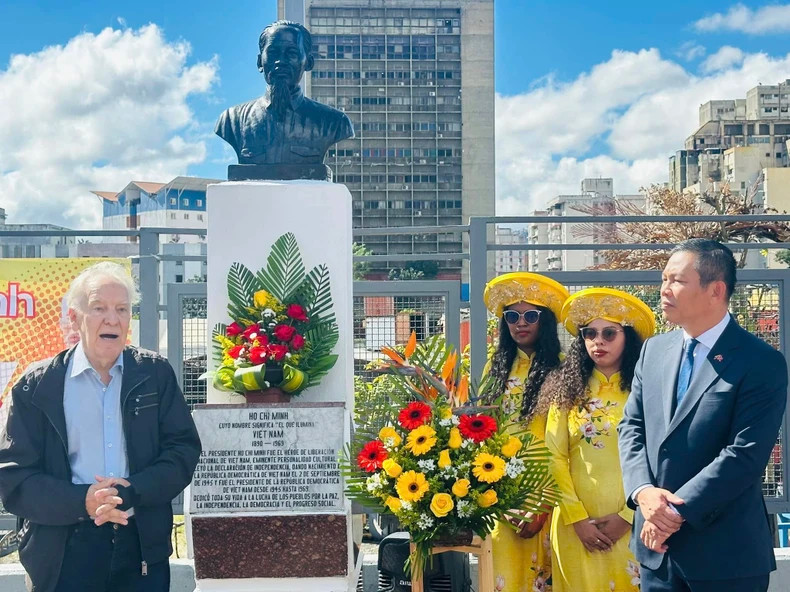 |
| Dr Carolus Wimmer at the ceremony to commemorate President Ho Chi Minh, at Bolívar Avenue, Caracas, on the occasion of the 35th founding anniversary of the diplomatic relations between Vietnam and Venezuela (December 18, 1989 - December 18, 2024), and the 80th anniversary of the founding of the Vietnam People's Army (December 22, 1944 - December 22, 2024) (Source: Vietnamese Embassy in Venezuela). |
Q: Currently, as the Chairman of the Venezuela-Vietnam Friendship House, could you share information about the artifacts displayed here?
A: The Venezuela-Vietnam Friendship House was established in 2020. However, due to many difficulties, it was not until January 2025 that we had our headquarters in the centre of the capital city of Caracas.
Currently, we are renovating two offices and three meeting rooms, one of which will be designed specifically for Ho Chi Minh Cadre School, one conference room. Accordingly, we will try to design a separate space for practicing traditional Vietnamese dance and Vovinam martial arts.
Regarding the artifacts to be displayed at the Venezuela-Vietnam Friendship House, we are actively coordinating with the Embassy of Vietnam in Venezuela, the Venezuela Friendship Association, and the Venezuela-Vietnam Friendship Association to search for and collect images and artifacts, thus contributing to making the Venezuela-Vietnam Friendship House a “red address” for the younger generation of Venezuela to better understand the traditional friendship and comprehensive partnership between Venezuela and Vietnam.
Thank you very much!
